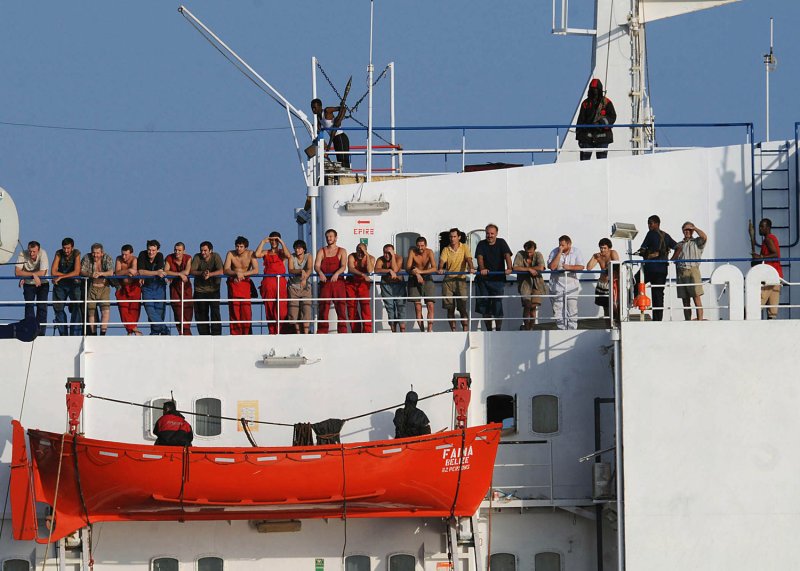1 of 6 | FLASHBACK: The crew of the merchant vessel MV Faina stand on the deck of the ship Sunday, October 19, 2008, after a U.S. Navy request to check on their health and welfare. The Belize-flagged cargo ship, owned and operated by Kaalbye Shipping, Ukraine, was seized by pirates on September 25th and forced to proceed to anchorage off the Somali Coast. The ship is carrying a cargo of Ukrainian T-72 tanks and related military equipment. (UPI Photo/Jason R. Zalasky/U.S. Navy) |
License Photo
WASHINGTON, Nov. 19 (UPI) -- Piracy is back. And in a big way. The heirs of Blackbeard -- 18th century Caribbean pirate Edward Teach -- and Anne Bonny are alive and well on the Somali main, looting the great ships of the world.
Pirates on Sunday took over the 1,080-foot Saudi supertanker Sirius Star when it was 450 miles off shore and have ordered it toward the Somali coast. It is said to be holding $100 million in Saudi oil.
On Wednesday the Indian Defense Ministry announced that its frigate INS Tabar had destroyed a large pirate "mother vessel" in a fierce combat engagement 285 nautical miles southwest of the Omani city of Salalah.
Several more attacks, including the seizing of a Hong Kong-registered vessel carrying 36,000 metric tons of wheat, recently have been reported.
U.S. Navy Adm. Michael Mullen, the chairman of the Joint Chiefs of Staff, said he was stunned by the breadth of Somali piracy attacks as groups have carried out about 90 hijackings in the Gulf of Aden so far this year.
But Mullen should not have been surprised. The scourge has been steadily growing over the past few years. And it is very profitable -- Somali officials say the pirates have reaped $50 million in ransoms this year as ship owners are willing to fork over funds rather than risk the ships.
Even an increased presence of warships from several countries hasn't slowed the pirates. International ship owners are noticing, ordering their craft to go around Africa rather than through the much shorter and economical -- if the ship isn't captured -- Gulf of Aden. That will increase overall costs, which will be passed up the economic food chain.
The new piracy isn't limited to the Gulf of Aden and the littoral waters of Arabia and the Horn of Africa. It has been an even more common and bloody scourge in another key waterway of the world -- the Strait of Malacca between parts of Malaysia and Indonesia in Southeast Asia.
That area was for many years a far more dangerous and bloodier region, but in recent years the Association of Southeast Asian Nations -- particularly Indonesia, Malaysia and Singapore -- has worked to police its waterways. Driven away but not destroyed, some of the pirates have found easier and richer pickings on the other side of the Indian Ocean off Somalia.
The key to the success of the security initiative in the Strait of Malacca was the prior existence of ASEAN. It provided a diplomatic structure within which cooperation between the relevant nations could be worked out and effective actions taken.
No such agreed international structure exists yet off the Horn of Africa. The Organization of African States has a terrible record in failing to prevent genocides and terrible blood baths in Rwanda, Congo and the Darfur region of Sudan. None of its member states has the naval resources needed to fight or defeat the pirates anyway.
The U.S.-led North Atlantic Treaty Organization does have those resources. But it also has its hands full waging a losing war in Afghanistan against the Taliban, and it is preoccupied with increasing tensions with Russia back home in Europe.
However, the dangers are real and growing. The threatened area within which the pirates operate covers an enormous 2 million square miles. Aircraft carriers and other expensive, modern high-tech naval assets are essential to secure it.
An added angle on the Gulf of Aden attacks is the problem of failed states, of which Somalia is a classic example.
Failed states are not just bad news for their inhabitants, but the anarchy can spill over to affect global trade and economics, especially through rising oil prices.
Armed merchantmen will not work. The overall expense will be prohibitive, and the pirates will still outgun them in firepower and aggressiveness.
Ultimately, the pirate bases will have to be eradicated. But that would require a powerful force agreed upon by major nations with interests in the region. And setting up such a security framework will not be easy.
The Africa Command of the U.S. armed forces recognizes that the ultimate source of the problem is Somalia's continued existence as a failed state. AFRICOM senior officers also recognize the best -- and most cost-effective -- way of eliminating the pirate scourge in the long term is to establish an effective state structure in Somalia with an army, navy and air force that can destroy the pirates or drive them out.
However, such an ideal solution is still years and maybe decades away, and in the meantime ships continue to be hijacked and sometimes crew members die. Somewhere, Blackbeard's ghost is laughing.















